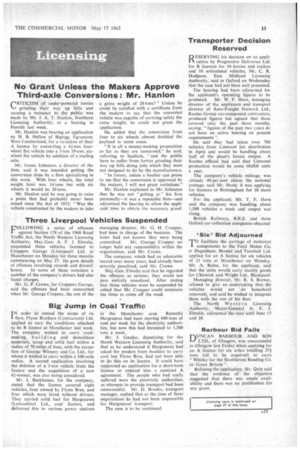No Grant Unless the Makers Approve Third-axle Conversions: Mr. Hanlon
Page 15

If you've noticed an error in this article please click here to report it so we can fix it.
CRITICISM of under-powered lorries grinding their way up hills and causing a nuisance to the public was made by Mr. J. A. T. Hanlon, Northern Licensing Authority, at a hearing in Penrith last week.
Mr. Hanlon was hearing an application ay H. B. Helion of Bigrigg, Egremont, West Cumberland, for a variation of their A licence by converting a 41-ton fourwheel flat vehicle into a 5-ton 19-cwt. sixwheel flat vehicle by addition of a trailing axle.
Mr. James Johnston, a director of the firm, said it was intended getting the conversion done by a firm specializing in this work. With four wheels, the total weight limit was 14 tons but with six wheels it would be 20 tons.
Mr. Hanlon said be was going to raise a point that had probably never been raised since the Act of 1933: Was the vehicle constructed by the makers to take a gross weight of 20 tons?" Unless he could be satisfied with a certificate from the makers to say that the converted vehicle was capable of carrying safely the extra weight, he could not grant the application. He added that the conversion from four to six wheels almost doubled the payload in some cases. "It is all a money-making proposition as far as they are concerned," he said, referring to hauliers, "and the public have to suffer from lorries grinding their way up hills doing jobs which they were not designed to do by the manufacturers.
"In future, unless a haulier can prove to me that the conversion is approved by the makers, I will not grant variations."
Mr. Hanlon explained to Mr. Johnston that he was not "getting at" his firm personally—it was a reputable firm—and adjourned the hearing to allow the applicant time to obtain the necessary proof.












































































































